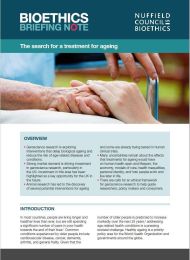The search for a treatment for ageing
Policy Briefing
Published 10/01/2018

Potential ageing treatments
Although questions remain about the underlying causes of ageing, animal studies have shown that it is possible to intervene in ageing processes. The main scientific developments in the search for ageing interventions are summarised below.
Metformin
Metformin has been used as an effective diabetes drug for over 50 years. It works partly by enhancing the activity of an enzyme involved in metabolic processes essential for health. The responsiveness of this enzyme has been found to decline with ageing, suggesting that metformin may have beneficial effects on the ageing process. The Targeting Aging with Metformin (TAME) clinical trial in the US, expected to start in 2018, will explore the effects of metformin on ageing in 3,000 men and women aged 60 or over who have no existing serious illnesses. This is the first trial to study the effects of a drug on biological ageing, which could pave the way to ageing being recognised by regulators as a disease and to further drug trials in this area.
Hormesis, dietary restriction, and rapamycin
Inducing a mild stress response in cells, known as hormesis, can delay ageing in animals. Exercise, heat, and radiation are all hormesis-inducing agents. However, the best studied agent is dietary restriction without malnutrition, which can extend healthy lifespan in a range of animals. In humans, it has been shown to reduce risk factors for diabetes, cardiovascular disease, and cancer, and to slow biological ageing, but dietary restriction is not desirable or realistic for most people.* Similar effects are seen when the activity of metabolic pathways that detect nutrients are reduced by gene mutations or drugs.** Rapamycin, for example, a drug used to prevent organ transplant rejection, inhibits the pathway involved in nutrient sensitivity and extends lifespan in animals. Despite the risk of serious side-effects, the effects of rapamycin on frailty in people aged 60 and over with heart disease are being explored in a small clinical trial in the US. A similar drug, RAD001, has been shown in a small trial to boost the immune system of healthy people aged 65 years or over.
*Everitt AV and Le Couteur DG (2007) Life extension by calorie restriction in humans Ann NY Acad Sci 1114: 428-33; Fontana L and Klein S (2007) Aging, adiposity, and calorie restriction JAMA 297: 986-94; Belsky DW et al. (2017) Change in the rate of biological aging in response to caloric restriction: CALERIE biobank analysis J Gerontol A Biol Sci Med Sci 73: 4-10.
**Fontana L et al. (2010) Extending healthy life span: from yeast to humans Science 328: 321-6; Veech RL et al. (2017) Ketone bodies mimic the life span extending properties of caloric restriction IUBMB Life 69: 305-14.
Resveratrol and other sirtuin inhibitors
A group of enzymes called sirtuins have a role in many cellular processes that affect ageing.* Chemicals that interact with sirtuins have strong potential as ageing treatments. Resveratrol, for example, a naturally occurring chemical found in red wine, is known to affect sirtuin activity and the ageing process in animals.** The resveratrol anti-ageing supplement market is already big business globally, but only small amounts of resveratrol are absorbed into the body when administered in humans and the long-term health effects are unproven. Synthetically produced sirtuin inhibitors show more promise, and some have been found to improve the health and extend the lifespan of mice.*** The pharmaceutical industry has invested heavily in the development of synthetic sirtuin inhibitors, but they have not yet been translated into drugs for human use.
*Bonkowski MS and Sinclair DA (2016) Slowing ageing by design: the rise of NAD+ and sirtuin-activating compounds Nat Rev Mol Cell Biol 17: 679-90; Li J et al. (2017) A conserved NAD+binding pocket that regulates proteinprotein interactions during aging Science 355: 1312-7.
**Borra MT et al. (2005) Mechanism of human SIRT1 activation by resveratrol: J Biol Chem 280: 17187-95; Kaeberlein M et al. (2005) Substrate-specific activation of sirtuins by resveratrol J Biol Chem 280: 17038-45.
***Minor RK et al. (2011) SRT1720 improves survival and healthspan of obese mice Sci Rep 1: 70; Mitchell S et al. (2014) The SIRT1 activator SRT1720 extends lifespan and improves health of mice fed a standard diet Cell Rep 6: 836- 43.
Stem cell therapy
Stem cells are unspecialised cells involved in repairing and replenishing other cells and tissues in the body. Stem cell function decreases with age, and injecting stem cells into animals has been shown to enhance the repair of age-related damage in organs such as the brain, and increase lifespan.* Until recently, there were significant barriers to the use of stem cells for therapeutic purposes in humans. Stem cells can be derived from donated embryos, but are prone to immune rejection when transplanted. The use of embryos is also ethically controversial. In 2006, it was discovered that stem cells could be generated from adult cells, opening up a range of new possibilities in the field of regenerative medicine. The effects of stem cell therapy on age-related conditions such as frailty and Alzheimer’s disease are being explored in early-stage clinical trials in the US.** Unproven and unlicensed stem cell treatments for a range of ‘rejuvenation’ purposes are also being offered by private clinics across the world.
*Lavasani M et al. (2012) Muscle-derived stem/progenitor cell dysfunction limits healthspan and lifespan in a murine progeria model Nat Commun 3: 608; Zhang Y et al. (2017) Hypothalamic stem cells control ageing speed partly through exosomal miRNAs Nature 548: 52-7.
**ClinicalTrials.gov (2017) Allogeneic human mesenchymal stem cells (hMSC) in patients with aging frailty via intravenous delivery (CRATUS); ClinicalTrials.gov (2017) Allogeneic human mesenchymal stem cell infusion versus placebo in patients with Alzheimer’s disease.
Young Blood
Research suggests that blood from young mice can have a rejuvenating effect in older mice. It was recently found that injecting one blood protein in particular called GDF11 can regenerate animal organs including the heart and brain. This was hailed as a major breakthrough in ageing research, but the findings have been disputed by companies developing drugs that inhibit, rather than stimulate, GDF11. Nevertheless, a number of commercial clinical trials are exploring the effects of transfusions of young blood in humans. One US study is recruiting 600 people aged 35 and older who will pay to receive a blood transfusion from a donor aged 25 or younger. Critics suggest the design of the study is dubious, both ethically and scientifically. Another trial, also in the US, is studying the effects of young blood transfusion in a small number of people with Alzheimer’s disease.
Telomerase and TA-65
The discovery in the 1980s that telomeres, the tips of chromosomes, are vital for cell division and repair earned the researchers a Nobel prize. Telomere shortening occurs with ageing and is associated with an increased incidence of disease and death.33 The enzyme telomerase lengthens telomeres and thus has been suggested as a target for anti-ageing interventions. The plant-based supplement TA-65, said to increase telomerase activity, is available to buy worldwide as an anti-ageing aid. Industry studies suggest TA-65 has beneficial effects on the health span of mice and humans.* The US-based manufacturer is now conducting clinical trials on healthy adults. However, the reliability and independence of these studies have been questioned and there are concerns that stimulating telomerase activity could increase the risk of cancer. Another way of activating telomerase – gene therapy – has been shown to increase lifespan and health span in mice without causing cancer. At least one biotechnology company is hoping to develop telomerase gene therapy for use in humans.
*de Jesus B et al. (2011) The telomerase activator TA-65 elongates short telomeres and increases health span of adult/old mice without increasing cancer incidence Aging Cell 10: 604-21; Harley CB et al. (2011) A natural product telomerase activator as part of a health maintenance program Rejuv Res 14: 45-56.
Senescent cells and senolytics
Damaged cells either die or they become senescent cells, which remain in the body and emit inflammatory chemicals. Studies in mice have shown that removing senescent cells delays age-related diseases and extends lifespan.* Several research groups and companies are now working on developing drugs, collectively called senolytics, that will selectively kill senescent cells. Several senolytics have been found to work in mice and it is likely they will be tested in human trials in the near future.**
*Baker DJ et al. (2011) Clearance of p16Ink4a-positive senescent cells delays ageing-associated disorders Nature 479: 232-6; Baker DJ et al. (2016) Naturally occurring p16Ink4a-positive cells shorten healthy lifespan. Nature 530: 184-9.
**Chang J et al. (2016) Clearance of senescent cells by ABT263 rejuvenates aged hematopoietic stem cells in mice Nat Med 22: 78-83; Yosef R et al. (2016) Directed elimination of senescent cells by inhibition of BCL-W and BCL-XL Nat Commun 7: 11190. ClinicalTrials.gov (2017) Senescence in chronic kidney disease; Kirkland JL et al. (2017) The clinical potential of senolytic drugs J Am Geriatr Soc 65: 2297-301.
Hormones and antioxidants
The anti-ageing effects of hormones have been studied for many years. Human growth hormone has been shown to be beneficial for the health of older people, but it has serious side effects making it unsuitable for widespread use. There is no firm evidence that other hormones, such as melatonin and insulin-like growth factor 1, have beneficial effects on ageing. The anti-ageing properties of antioxidants such as vitamins A, C, and E have also been explored. The theory is that they repair damage caused by toxic molecules called reactive oxygen species (ROS), which accumulate in cells with age. However, there is no clear evidence that antioxidants delay ageing, with some studies even suggesting they can be harmful to health.*
*Bjelakovic G et al. (2007) Mortality in randomized trials of antioxidant supplements for primary and secondary prevention: systematic review and meta-analysis JAMA 297: 842-57; Sayin VI et al. (2014) Antioxidants accelerate lung cancer progression in mice Sci Transl Med 6:221ra15.

Share